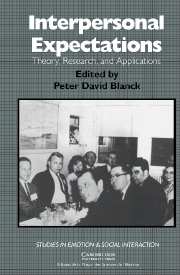Book contents
- Frontmatter
- Contents
- Preface
- List of contributors
- Introduction
- Part I Research on interpersonal expectations
- 3 Introduction to research on interpersonal expectations
- 4 Interpersonal expectations in the courtroom: Studying judges' and juries' behavior
- 5 Expectancies and the perpetuation of racial inequity
- 6 Pygmalion - 25 years after interpersonal expectations in the classroom
- 7 Interpersonal expectations in organizations
- 8 Interpersonal expectations and the maintenance of health
- 9 Precursors of interpersonal expectations: The vocal and physical attractiveness stereotypes
- 10 In search of a social fact: A commentary on the study of interpersonal expectations
- Part II Research on the mediation of interpersonal expectations through nonverbal behavior
- Part III The study of interpersonal expectations
- Author index
- Subject index
- Studies in Emotion and Social Interaction
5 - Expectancies and the perpetuation of racial inequity
from Part I - Research on interpersonal expectations
Published online by Cambridge University Press: 23 December 2009
- Frontmatter
- Contents
- Preface
- List of contributors
- Introduction
- Part I Research on interpersonal expectations
- 3 Introduction to research on interpersonal expectations
- 4 Interpersonal expectations in the courtroom: Studying judges' and juries' behavior
- 5 Expectancies and the perpetuation of racial inequity
- 6 Pygmalion - 25 years after interpersonal expectations in the classroom
- 7 Interpersonal expectations in organizations
- 8 Interpersonal expectations and the maintenance of health
- 9 Precursors of interpersonal expectations: The vocal and physical attractiveness stereotypes
- 10 In search of a social fact: A commentary on the study of interpersonal expectations
- Part II Research on the mediation of interpersonal expectations through nonverbal behavior
- Part III The study of interpersonal expectations
- Author index
- Subject index
- Studies in Emotion and Social Interaction
Summary
Introduction
Twenty-five years ago, scientists and the public were introduced to experimental demonstrations of expectancy effects in science, education, and medicine (Beecher,1966; Rosenthal, 1966; Rosenthal & Jacobson, 1968). At the same time, the pervasiveness and complexity of racial inequity in the United States were becoming increasingly evident. Recent decades have brought fuller recognition that barriers to racial change are produced by intrapersonal, interpersonal, and institutional dynamics, often linked in intricate positive feedback systems. This chapter examines the role of intrapersonal, interpersonal, and institutionalized expectations in these feedback systems, considering a set of topics related to racial inequity in education:
1. white opposition to busing,
2. long-term effects of segregated schooling on blacks, and
3. white teachers' treatment of black students;
and a second set of topics related to racial inequality in employment:
4. interaction of black employees with white supervisor and co-workers,
5. white reactions to race-targeted interventions, and
6. psychological effects of affirmative action on its black beneficiaries.
These six topics were selected for their importance and because a research literature exists on each. The reader will soon realize, however, that only a small proportion of the research reviewed here examines expectation effects explicitly. Translating findings and ideas from other social psychological frameworks into the language of expectancy effects is part of the work of this chapter.
Interpersonal, intrapersonal, and institutionalized expectations
The multifarious roles of expectations in positive feedback systems that perpetuate racial inequity can best be understood if distinctions and relationships among interpersonal, intrapersonal, and institutionalized expectations are appreciated. A highly useful discussion of interpersonal and intrapersonal expectations was provided by Darley and Fazio (1980). These analysts note that interpersonal behavioral sequences, in which the perceiver's behavior evokes confirming behavior from the target, is the essence of the self-fulfilling prophecy effect described by Merton (1948). However, their outline and a congruent sketch by Jones (1986) also describe two forms of intrapersonal expectation dynamic, one that falls short of Merton's criterion and one that goes beyond it.
- Type
- Chapter
- Information
- Interpersonal ExpectationsTheory, Research and Applications, pp. 88 - 124Publisher: Cambridge University PressPrint publication year: 1993
- 1
- Cited by



